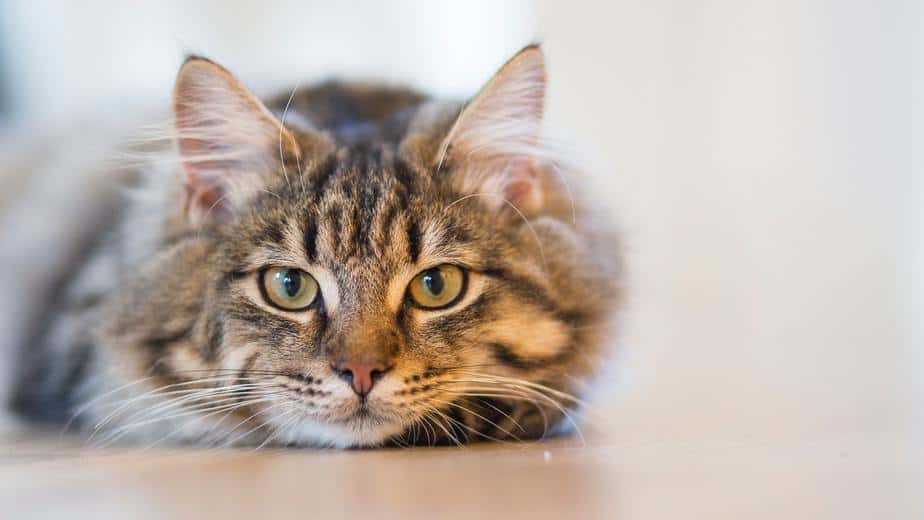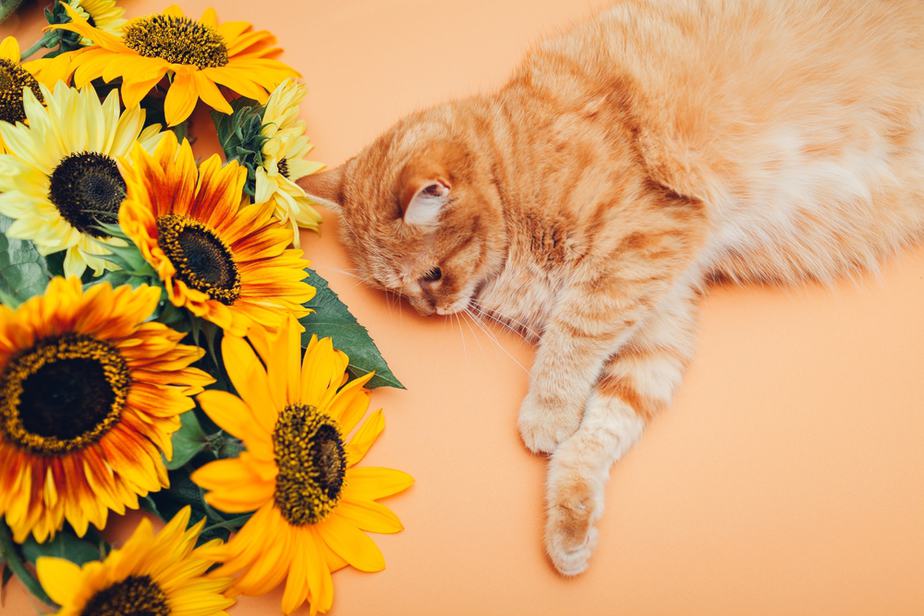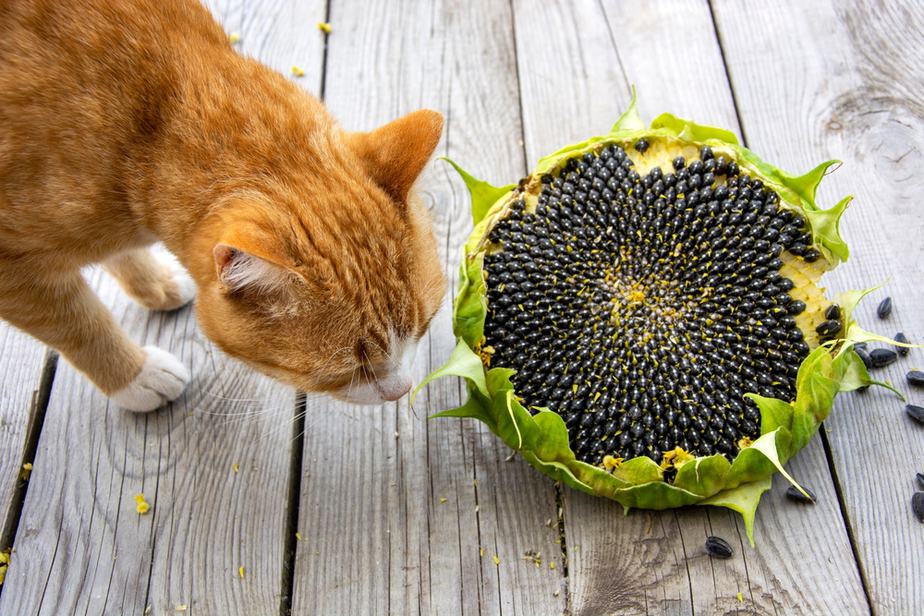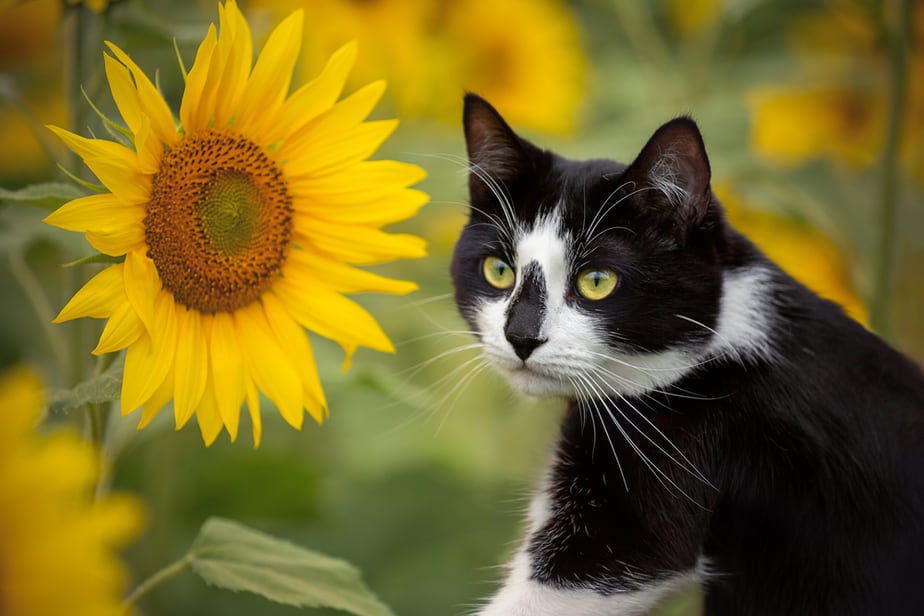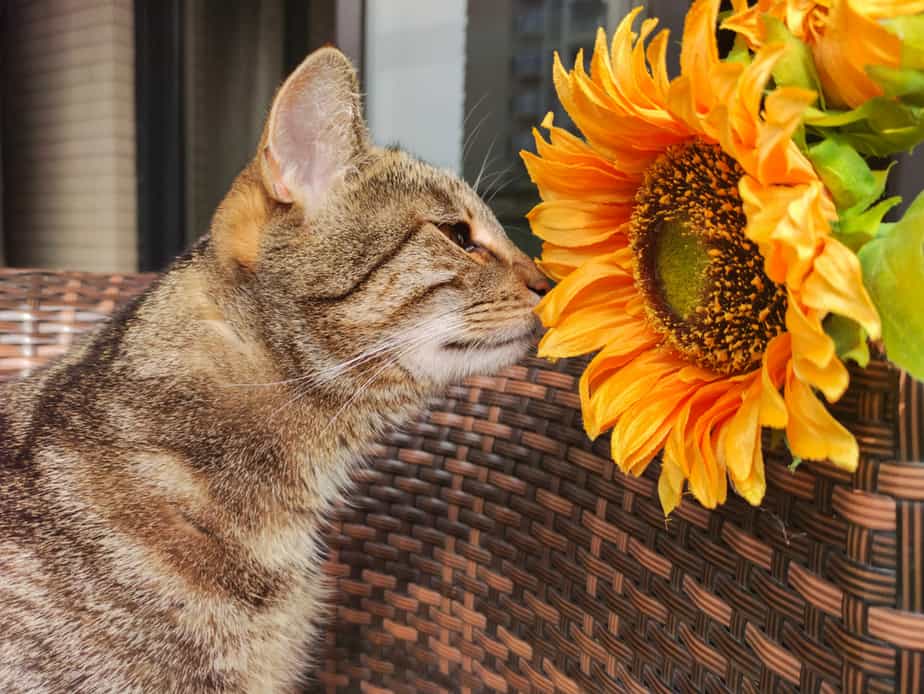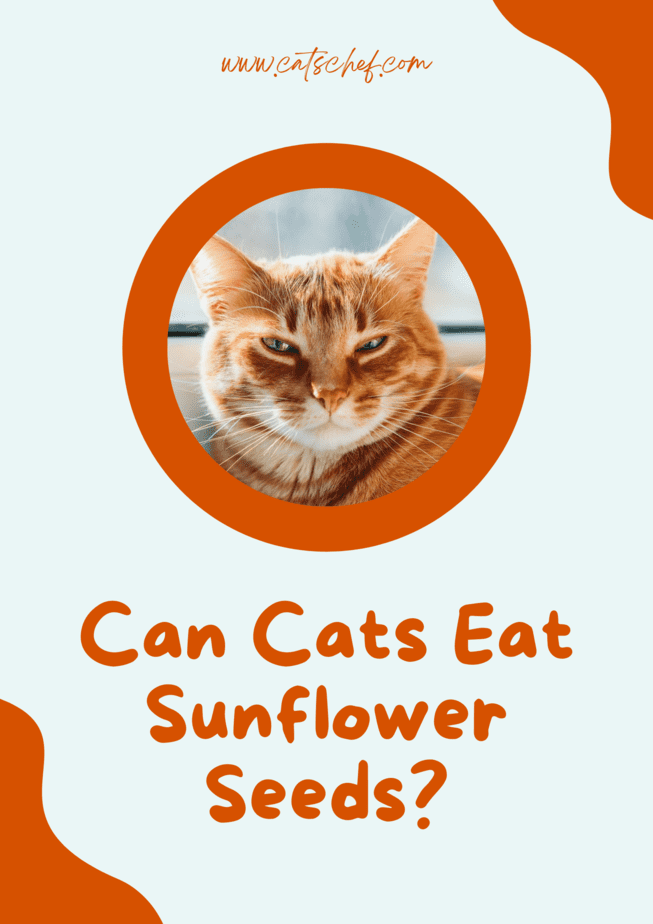📖 Table of Content:
“I was preparing healthy snacks for movie night with my favorite furry friend. I left the room for ONE SECOND and when I got back, her head was fully submerged in the bowl and she was munching on those seeds like there was no tomorrow! Can cats eat sunflower seeds!?”
You can’t argue with the fact that your cat is a real snoop. She doesn’t shy away from exploring the world around her, especially if that world involves the kitchen. You might think you will be able to hide something from her, but… you won’t.
And you also won’t be able to resist her pouty snout when she begs you to give her a bite of whatever you’re eating at the moment. Let’s be honest, saying no to her feels like betraying the one thing you love the most in this world!
So, the only thing left to do is google “Can cats eat sunflower seeds?” and hope for a positive answer. This might be your lucky day because… Cats can enjoy this delicious snack!
According to the ASPCA (American Society For The Prevention Of Cruelty To Animals), these savory snacks aren’t toxic to cats. But – there’s always a but when it comes to feeding your four-legged friend something that shouldn’t be a regular part of a cat’s diet…
How to feed your cat sunflower seeds safely? How many of these can your cat eat? When not to feed them to your cat? Trust me, if you would like to avoid an emergency vet trip, keep on reading this article!
So, can cats eat sunflower seeds?
Sunflower seeds are incredibly delicious and versatile. You can eat them straight from the bag or sprinkle them on your bread, pastries, acai bowls, smoothies… The list goes on and on. It’s no wonder your feline friend wants to give them a taste!
Sunflower seeds come from, you guessed it, the sunflower plant. Sunflower kernels are hidden within the hull, also known as the sunflower seed shell. Believe it or not, one sunflower head can contain up to 2,000 sunflower seeds!
(Also, this has to be some sort of a record for how many times you can mention the word sunflower in one paragraph!)
Luckily for you, these savory snacks are completely safe for your feline friend. They’re packed with vitamins, minerals, antioxidants, plant protein, and fiber. They’re a great option for your cat when she gets bored with her regular cat food.
But… That doesn’t mean you should rely on sunflower seeds for your cat’s daily dose of nutrients. Cats are carnivores – they require predominantly animal-sourced nutrients in their diet.
While sunflower seeds do pack a nutritious punch, they should comprise no more than 10% of your cat’s food intake. Your four-legged friend might end up dealing with some unwanted side effects and health issues if you go overboard with this savory snack.
And as a general rule of thumb, always consult with your vet before making any significant changes to your cat’s diet. With that disclaimer out of the way, let’s dig a bit deeper and discover the benefits and risks sunflower seeds bring to your cat’s table.
What’s good about sunflower seeds?
Your feline friend seems to have become obsessed with these tasty treats and you have no idea what to do. Can cats even eat sunflower seeds with no repercussions!?
As a cat owner trying to decide whether to include certain foods in your cat’s diet, you have an incredibly difficult task on your hands. You have to check whether they’re labeled as toxic by the ASPCA, whether they contain any harmful ingredients, and whether they’re suitable for your cat’s stomach.
And even if they tick all the boxes, you shouldn’t forget to check their nutritional value. Luckily, sunflower seeds do all the work for you. Not only are they completely safe for your four-legged friend, but they are also packed with vitamins, minerals, antioxidants, plant protein, and fiber.
If this is your first time googling these tasty treats, read on to get the down-low on sunflower seeds for feline consumption.
1. Rich in vitamins
Unlike chia seeds, sunflower seeds contain heaps of vitamins such as riboflavin, niacin, vitamin B1, vitamin C, and vitamin E. Your cat should get most of her vitamins from her regular cat food, but a couple of sunflower seeds here and there shouldn’t cause any harm.
So, let’s talk vitamins! Vitamin B1 (or thiamine) is an essential vitamin in your cat’s diet. This means that it’s necessary for your cat’s health and it should be an important part of your cat’s diet. Vitamin B1 is crucial for your cat’s brain function, as well as the proper function of all her organs.
Vitamin B1 deficiency is an incredibly dangerous condition, which is why you should make sure your feline friend consumes plenty of foods that are rich in this vitamin. Symptoms of vitamin B1 deficiency include impaired vision, dilated pupils, seizures, and tremors.
Vitamin B2 (or riboflavin) is essential for proper growth, development, and energy production. It also helps break down fat cells, drives oxygen through your cat’s body, and contributes to your cat’s skin and fur health. Incredible health benefits!
Vitamin E is essential for your cat’s immune system, fertility, muscular function, and cardiovascular health. Additionally, vitamin E also contributes to your cat’s skin and fur health. The most obvious signs of vitamin E deficiency include muscle weakness, heart dysfunction, and liver hepatitis.
2. Rich in minerals
Sunflower seeds contain a bunch of minerals such as calcium, iron, magnesium, manganese, potassium, selenium, and zinc. While your feline friend should get most of her minerals from animal sources, it doesn’t hurt to throw in a couple of sunflower seeds in the mix.
Minerals play an essential role in maintaining your cat’s health and happiness:
Calcium, for example, regulates fluid concentration in your cat’s cells and helps send electrical charges throughout your cat’s body.
Calcium deficiency is an incredibly scary condition with symptoms like restlessness, weakness, muscle tremors, and hypersensitivity to sound and touch. Sunflower seeds are rich in calcium, making them a great choice for your cat!
Magnesium is a great ally in fighting against intestinal blockages caused by those pesky hairballs. It also helps with other digestive issues such as constipation, diarrhea, and vomiting. Lastly, it helps to fight against urinary disorders and manage struvite urine crystals.
Manganese is essential for the use of protein and carbohydrates in your cat’s body. Your cat’s digestive system doesn’t contain the enzymes necessary to break down certain foods, and that’s where manganese steps in. Quite the handy mineral to have!
Selenium is the thing you need if you’re looking to boost your cat’s immune system. It’s pretty much great for everything, which means you can’t go wrong if you incorporate a couple of selenium-rich foods into your cat’s diet.
3. High protein content
Cats and protein? A match made in heaven! But… Plant protein, which is the kind contained within sunflower seeds, might not be as beneficial to your feline friend as you might think.
Cats are carnivores, which means they require a bunch of meat, animal protein, and animal-sourced nutrients in their diet. Animal protein is what makes them strong, helps them build and repair muscle, maintains adequate hormone levels, and ensures their overall health.
Does that mean plant protein has no business being in your cat’s diet? Not necessarily. While plant protein might not be able to replace the real deal, it’s still a great way to boost your cat’s protein levels.
Luckily, sunflower seeds are packed with plant protein. A couple of sunflower seeds sprinkled on top of your cat’s food can only do good!
4. High fiber content
Here’s the thing. Your cat’s digestive system isn’t designed to deal with heaps of fruit, veggies, plants, and grains. It’s designed to process animal-based foods.
But… That doesn’t mean that your cat’s diet shouldn’t include anything else. In fact, it’s quite common among cats to develop various digestive issues because they lack the enzymes necessary for them to break down and process different types of food.
What does that have to do with sunflower seeds? Well, sunflower seeds are incredibly high in fiber. Fiber is a type of carbohydrate that provides bulk to help food move through your cat’s digestive tract. Quite a handy tool!
It’s also great for cats who are dealing with digestive issues such as upset stomach, constipation, diarrhea, and vomiting. Whether your feline friend is feeling healthy or under the weather, sunflower seeds might be a great choice to add some variety, flavor, and texture to her food.
What’s bad about sunflower seeds?
You can’t have the good without the bad, can you? While sunflower seeds are completely safe for feline consumption, there are a couple of things you should take into consideration when deciding whether to include them in your cat’s diet.
So, what’s bad about sunflower seeds? Can cats eat sunflower seeds without getting any adverse reactions?
They can, but you have to understand that there’s a right and a wrong way to feed sunflower seeds to your cat. What do we mean by that?
First things first, sunflower seeds are typically encased in a sunflower seed shell (or hull). Not only can this shell cause internal injuries because it’s incredibly sharp, but it can also get stuck in your cat’s throat and gums. This is why you should always remove the shell before feeding sunflower seeds to your cat.
In addition to that, sunflower seeds are packed with healthy fats, but bear in mind that they’re still fats. While these have their own set of health benefits, they aren’t the best choice for chonky cats.
You should probably avoid feeding your cat sunflower seeds if she’s struggling with excess weight. She might be absolutely adorable with all that extra fluff, but she’s going to be much happier when she’s at a healthy weight.
And even if your kitto isn’t obese, still avoid feeding your cat too many sunflower seeds. This would put your cat at risk of developing various digestive issues such as upset stomach, abdominal pain, diarrhea, and vomiting.
And lastly, make sure you only feed your cat with organic sunflower seeds with no preservatives, additives, or seasonings. These harmful ingredients can lead to serious health issues if they’re consumed over an extended period of time.
Can cats eat sunflower oil?
You can’t google “Can cats eat sunflower seeds?” without checking whether cats can eat other sunflower-based products. If your four-legged friend likes the taste of sunflower seeds, she might enjoy some sunflower oil drizzled on cat food, tuna, or some other tasty treat.
So, can cats eat sunflower oil? They absolutely can! According to the ASPCA, sunflower oil is completely safe for feline consumption. It’s a great source of omega-3 fatty acids and an excellent aid in preventing heart disease.
The only thing to be careful with is the amount of sunflower oil you add to your cat’s diet. Too much can lead to weight gain, diabetes, and obesity. It can also cause various digestive issues such as stomach discomfort, nausea, vomiting, and diarrhea.
What about sunflower butter?
Cats can eat sunflower butter, too! Butter gets a passing grade in the feline world. In fact, sunflower butter might be better for your feline friend than regular sunflower seeds. Not only is it much easier to digest, but it also removes the risk that comes with sunflower seed shells.
As with any other human food, though, don’t go overboard with it. You can add a small amount of sunflower butter to her regular food, or you could even let her lick a tiny bit straight from the bowl. As long as you make sure she doesn’t eat the entire brick, she should be completely fine.
The only thing to be careful with is store-bought sunflower butter. Always check the ingredients list to see if it contains additives, preservatives, seasoning, or anything else that might be harmful to your cat.
Can cats eat sunflower seeds? Final verdict!
There’s no doubt that cats can eat sunflower seeds! As long as you make sure to remove the shell, serve it up plain, and offer it to your feline friend every now and then, you have nothing to worry about.
Sunflower seeds are packed with vitamins, minerals, antioxidants, plant protein, and fiber. They come with a variety of nutritional and health benefits and make for a great afternoon snack for your precious princess.
So, there you have it. Sunflower seeds are among the best seeds you can give to your cat. Chia seeds, flaxseeds, and pumpkin seeds might come close, but they have nothing on these incredibly versatile savory snacks.
Read more: Can Cats Eat Poppy Seeds? What Are The Possible Risks?
